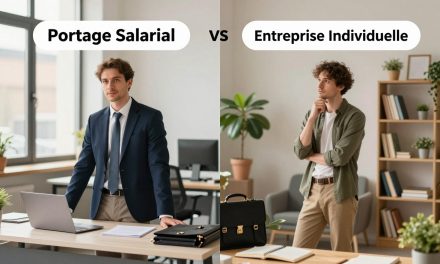Taking the leap into self-employment can feel overwhelming. You’re not just building a business—you’re shaping your future. In France, the freelance economy has grown by 92% since 2013, proving that independence is more than a trend—it’s a movement.
We understand the challenges. That’s why we partner with MAIF to offer administrative and insurance support, ensuring you’re protected every step of the way. Whether you’re just starting or refining your skills, our programs are designed to help you thrive.
With CPF funding available, investing in your growth has never been easier. Our approach blends expertise with long-term stability, so you can focus on what matters—your success.
Table of Contents
Key Takeaways
- Freelance work in France has surged by 92% since 2013.
- MAIF provides essential support for administrative and insurance needs.
- Training programs are tailored for career security in a competitive market.
- CPF funding makes skill development accessible.
- Expert guidance ensures long-term stability for freelancers.
Introduction: Why Freelancers Need Specialized Training
Behind the glamorous ‘digital nomad’ lifestyle lies a world of administrative hurdles. Many new solo professionals struggle with client acquisition, pricing, and legal protections. In France, 25% abandon self-employment within a year due to these challenges.
- Pricing strategies: Undercharging or misvaluing services.
- Contract disputes: Unclear terms leading to unpaid work.
- Income fluctuations: Lack of financial safety nets.
Partnering with MAIF mitigates risks through tailored insurance, covering professional liabilities and contract conflicts. Meanwhile, CPF funding reduces the financial burden of upskilling.
Top programs target critical gaps:
- Positioning your services competitively.
- Negotiating contracts confidently.
- Stabilizing income through long-term client relationships.
Ready to avoid common erreurs? Explore formations pour freelance to savoir plus about building a resilient career.
Top Paid Training Programs for Freelancers in France
France’s top-tier training courses blend practical skills with financial security for long-term success. These programs tackle everything from client acquisition to legal compliance, ensuring you’re equipped to thrive in your activité freelance. With CPF financement options, investing in your future is both smart and accessible.
Super Freelance’s 8-Module Program
This formation complète combines video lessons and live coaching for €1,485 (CPF-eligible). The 8 modules cover:
- Pricing mastery: Set rates that reflect your worth.
- Contract templates: Avoid disputes with legally sound agreements.
Graduates report a 74% boost in client retention post-training.
Livementor’s Personalized Mentorship
A 3-mois program featuring 30+ videos, a private FB group, and 1:1 sessions with a mentor. Unique perks include:
- AI prospecting tools: Automate lead generation.
- Negotiation scripts: Close deals confidently.
Digi Atlas’s Marketing-Focused Curriculum
Ideal for creatives, this course includes CRM templates and legal bonuses. Small-group coaching ensures tailored feedback. Key takeaways:
- Lead generation systems: Fill your pipeline consistently.
- Accounting basics: Manage finances like a pro.
Cette formation is a game-changer for those prioritizing scalable growth.
Why « Formations pour Freelance » Matter for Career Growth
Standing out as a freelancer requires more than just skills—it demands proof of expertise. Certified professionals earn 23% more than peers, according to industry data. Clients on platforms like Malt and Upwork prioritize profiles with verified training, seeing them as lower-risk partners.
Specialization amplifies this advantage. A graphic designer with UX certification, for example, can command higher rates than a generalist. The 2iPortage alumni case study proves it: one freelancer boosted earnings from €45k to €72k annually after mastering niche compétences.
Trust is another critical factor. MAIF’s professional insurance signals reliability, reassuring clients about contract security. In France’s evolving market, AI adaptation is now essential. Training programs that include AI tools prepare you for future activité demands.
Here’s how to leverage certifications:
- Profile visibility: Highlight credentials on LinkedIn and freelance platforms.
- Pricing power: Use specialized skills to justify higher service rates.
- Client retention: MAIF-backed assurances reduce onboarding friction.
Investing in structured learning isn’t just about skills—it’s about building a resilient, high-earning career.
Free Resources to Launch Your Freelance Journey

Starting your freelance career doesn’t require a huge budget—free resources can set you up for success. From operational guides to mentor-led programs, these tools help you navigate early challenges while saving funds for critical investments.
Freebe’s Blog and Guides
Freebe offers four operational guides, including an administrative checklist to streamline your *démarches*. Their content calendar aligns with quarterly business planning, helping you stay organized. Key features:
- Lead generation templates: Fill your pipeline faster.
- MAIF partner codes: Discounted legal consultations for *clients*.
Livementor’s 5-Day Email Course
This *formation gratuite* delivers actionable lessons via email, with a 68% conversion rate. Topics include:
- Pricing strategies: Set competitive rates from day one.
- Contract basics: Protect your work legally.
2iPortage’s Certified Free Program
An 85-hour state-certified course with mentor support. Their *cette formation* stands out with:
- Rémunération des heures: Earn while learning.
- Portfolio reviews: Get feedback on real projects.
| Resource | Key Benefit | Time Commitment |
|---|---|---|
| Freebe | Administrative checklists | Self-paced |
| Livementor | Email-based coaching | 5 days |
| 2iPortage | State-certified hours | 85 hours |
While paid programs offer depth, these free tools provide *accès* to expert knowledge. Pair them with MAIF’s support for a risk-free start.
Key Modules in a Complete Freelance Training
Success in self-employment starts with mastering core business modules. These structured lessons turn theory into practice, helping you build a resilient activité. From defining your niche to closing deals, each component addresses critical gaps freelancers face.
Defining Your Service Offer
Clarity attracts clients. Specialized training helps you:
- Identify niches: Use frameworks to pinpoint high-demand skills.
- Set competitive tarifs: Comparative matrices reveal sector-specific rates.
- Leverage MAIF’s Captain Contrat: Access legal templates that cut setup time by 40 hours.
Mastering Administrative Basics
Paperwork shouldn’t derail your entreprise. Key lessons include:
- Micro-entreprise vs SASU: Decision trees simplify legal choices.
- Tax workflows: Automate deductions and invoicing.
- MAIF insurance perks: Coverage for contract disputes and liabilities.
Prospecting and Closing Clients
Turn leads into long-term partnerships. Top programs teach:
- AI-powered prospecting: Tools to filter high-value clients.
- Scripted negotiations: Phrases that secure fair service terms.
- Pipeline management: Systems to stabilize income fluctuations.
With these modules, you’ll transform uncertainty into a scalable activité. The right training isn’t just about skills—it’s about building a business that lasts.
How to Choose the Right Formation for Your Niche

Finding the perfect training for your niche is like choosing the right tool for a job—precision matters. With 68% of Digi Atlas students securing clients within 90 days, the right program can fast-track your success. Here’s how to match your goals with the best resources.
Match Your Industry to Training Providers
Not all courses fit every field. Use this guide:
- Creative Services: Digi Atlas for marketing and CRM tools.
- Tech & IT: Livementor’s AI prospecting modules.
- Consulting: Super Freelance’s contract templates.
Evaluate Time Commitments
Balance learning with work. Intensive bootcamps (2–4 weeks) suit quick upskilling, while modular courses let you manage your *temps* flexibly. MAIF’s checklist helps validate niche demand before investing.
Assess Mentorship Quality
Look for programs offering:
- 1:1 sessions for tailored *conseils*.
- Hands-on *expérience* with real projects.
- Alumni networks for ongoing support.
“CPF eligibility windows reset annually—plan training before December to maximize funding.”
Learn more (*savoir plus*) about MAIF’s risk assessment tools to ensure your niche has long-term potential. The right training isn’t just about skills—it’s about strategic growth.
Leveraging CPF and Other Funding Options
Smart funding choices can make or break your freelance career. In France, the CPF (Compte Personnel de Formation) covers up to €1,500 annually for certified programs. This transforms skill development into an affordable investment.
- Decode CPF rules: Hours accumulate yearly—full-time workers earn €500–800 per mois.
- Regional boosts: Occitanie adds €300 to CPF allocations for local entreprise growth.
- MAIF partnerships: Insured freelancers access co-financing for 30% of training costs.
Timing matters. CPF applications take 23 days on average—apply early to secure slots. For faster approvals, MAIF’s pre-vetted programs streamline paperwork.
“OPCO funds niche certifications, while ARCE aids startup costs for the newly self-employed.”
Beyond CPF, explore:
- OPCO: Sector-specific grants for tech and creative fields.
- Pôle Emploi: Up to €2,000 for career transitions.
- ARCE: Lump-sum support during your first year.
Pair these with MAIF’s legal safeguards to build a financially secure career. Every euro saved on training is a step toward long-term stability.
Conclusion: Building a Sustainable Freelance Career
Building a lasting career as an independent professional requires strategy and protection. MAIF’s 360° framework safeguards your activité freelance with insurance and legal support, letting you focus on growth.
By 2025, AI and niche skills will dominate the market. Continuous learning—fueled by CPF funding—keeps you competitive. Specialized training helps attract high-value clients and stabilize income.
Ready to future-proof your career? Explore Livementor and MAIF’s partnered programs for expert guidance. Your journey isn’t just about independence—it’s about thriving wisely and securely.
FAQ
What makes freelance training different from general business courses?
Freelance training focuses on practical skills like client acquisition, pricing strategies, and legal compliance—tailored specifically for independent professionals rather than traditional employees.
Can I use CPF funding for freelance training programs?
Yes, many accredited programs in France accept CPF financing. Check each provider’s eligibility requirements and ensure the course is registered under your personal CPF account.
How long does it take to complete a comprehensive freelance training?
Most programs range from 4 weeks to 3 months, depending on intensity. Self-paced options like Livementor’s mentorship allow flexibility, while structured courses like Super Freelance follow fixed timelines.
Are free resources enough to start a freelance career?
Free guides (e.g., Freebe’s blog) are great for basics, but paid training offers deeper insights, templates, and mentor support—critical for avoiding costly early mistakes.
What’s the most overlooked module in freelance training?
Administrative basics (taxes, contracts, insurance) are often skipped but essential. Programs like Digi Atlas dedicate entire modules to these safeguards.
How do I know which training fits my niche?
Match the curriculum to your service type (e.g., marketing vs. tech). Look for niche-specific case studies, like 2iPortage’s focus on IT freelancers.





